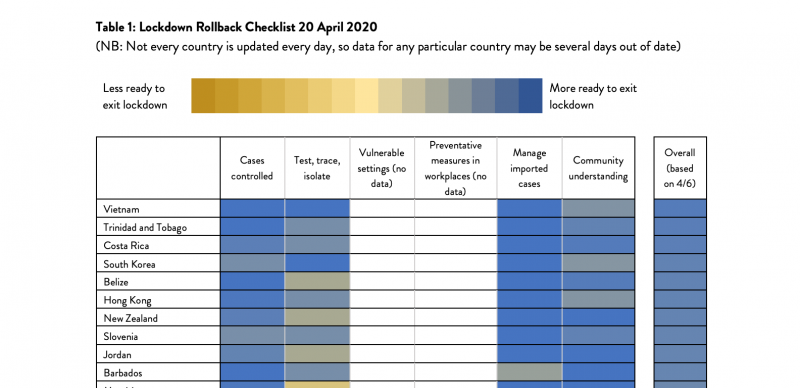
A screenshot of the title page of the study by the Oxford COVID-19 Government Response Tracker (OxCGRT), which assessed the readiness of various countries to relax COVID-19 physical distancing measures.
In a press conference on April 29, 2020, Terrence Deyalsingh, Trinidad and Tobago's minister of health, highlighted a study conducted by the Oxford COVID-19 Government Response Tracker (OxCGRT), which provided “a cross-national overview of which countries meet four of the World Health Organisation’s (WHO) six recommendations for relaxing physical distancing measures”. On the list, Trinidad and Tobago ranked second, just after Vietnam. The only other Caribbean nation in the top 10 is Barbados.
While this may be welcome news in terms of how effectively the government has been coping with the pandemic (as of April 30, the country recorded 116 COVID-19 cases, with 72 patients discharged and eight deaths), the minister has said that the study's findings should not lure citizens into a false sense of security.
The study itself also laid out the challenges the researchers encountered in collating the available data:
While the OxCGRT data cannot fully say how ready countries are to leave lockdown, it does provide for a rough comparison across nations. Even this ‘high level’ view reveals that few countries are close to meeting the WHO criteria for rolling back lockdown measures.
At the time of writing [April 23, 2020], only a handful of countries are doing well at the four ‘checklist’ criteria OxCGRT is able to track.

A screenshot of the table from the study by the Oxford COVID-19 Government Response Tracker (OxCGRT), which shows Trinidad and Tobago in second place re: preparedness to roll back some of its imposed COVID-19 stay-at-home restrictions.
Naturally, one of the variables to be considered is that the study was unable to secure data for two categories that help the WHO determine whether or not a country is ready to roll back lockdown measures: vulnerable settings and preventative measures in workplaces. The other four criteria — controlled cases, success with testing, tracing and isolating, the management of imported cases and community understanding — were ranked on a grid ranging from “less” to “more ready to exit lockdown”. Of these, Trinidad and Tobago's performance was slightly lower when it came to testing and community understanding.
Social media users were quick to weigh in. On Facebook, Tenten Allegra warned:
It does *not* at all mean that it is time to end the restrictions. That will be decided by the CMO, the panel of experts in charge and all our boxes in this table need to be solid blue. No country is truly ready to lift restrictions but it *does* mean that in terms of ability to *begin* getting life forward to the new normal, we are in one of the best positions in the world to **consider** easing the lockdown come May 15th. That's something to feel encouraged by. Keep up the good work!
May God bless our nation! ?????
Dr. Roshan Parasram, Trinidad and Tobago's chief medical officer, has already advised of a “new normal”, even as restrictions may be lifted bit by bit. The country's current restrictions stay in place until May 10, 2020.
Attorney Emir Crowne, however, was a bit more sceptical of Minister Deyalsingh's assessment:
When Minister Deyalsingh said — in the context of clearing up misinformation no less — that Trinidad & Tobago ‘ranked second’ by ‘the University of Oxford’, here is what he neglected to mention:
1) The ‘ranking’ is based on a research note prepared by the Blavatnik School of Government. It is not peer-reviewed. It is not a ‘report';
2) ‘Because the data only measure four of six recommended actions, we should be cautious about inferring what countries are ready to rollback lockdown from this measure.’ (from the research note itself) […]
Founded in 2010, the Blavatnik School of Government is a school of public policy that forms part of the University of Oxford's Social Sciences Division.
In examining the list, blogger and Global Voices’ Jamaica-based contributor Emma Lewis noted:
Trinidad and Tobago is ranked second […] as ready to lift its lockdown. Another CARICOM country, Belize, is not far behind in fifth place […] Barbados is in tenth place. Aruba, Guyana, Bermuda, Dominican Republic and Cuba (in that order) are in varying states of readiness. Jamaica, according to this survey, is the third lowest-ranking Caribbean country in terms of being prepared to lift an economic lockdown. Dominica, whose economy was battered and hardly recovered from devastating natural disasters, is the lowest ranking [Caribbean territory]. Cuba, which has its own peculiar set of economic challenges, is the second lowest. I did not find every Caribbean country on the list — perhaps reliable data is not available.
Concerned about the Jamaican government's apparent eagerness to get the economy up and running, Lewis continued:
I would like to give the prime minister some unsolicited advice: Deal with the virus, first. Get things under control, as the WHO suggests. Then and only then will we be ready to go back to what you call the ‘new normal’, which I am afraid will inevitably and quickly become ‘business as usual’.
Likewise, for many in Trinidad and Tobago, there remains a high level of caution around the lifting of restrictions — but there are also calls to get the nation's economy moving safely again. Social media users like journalist Judy Raymond, however, have observed people seemingly reverting to “the old normal”.
The country will reassess its position come May 10. In the meantime, the battle against COVID-19 continues.







